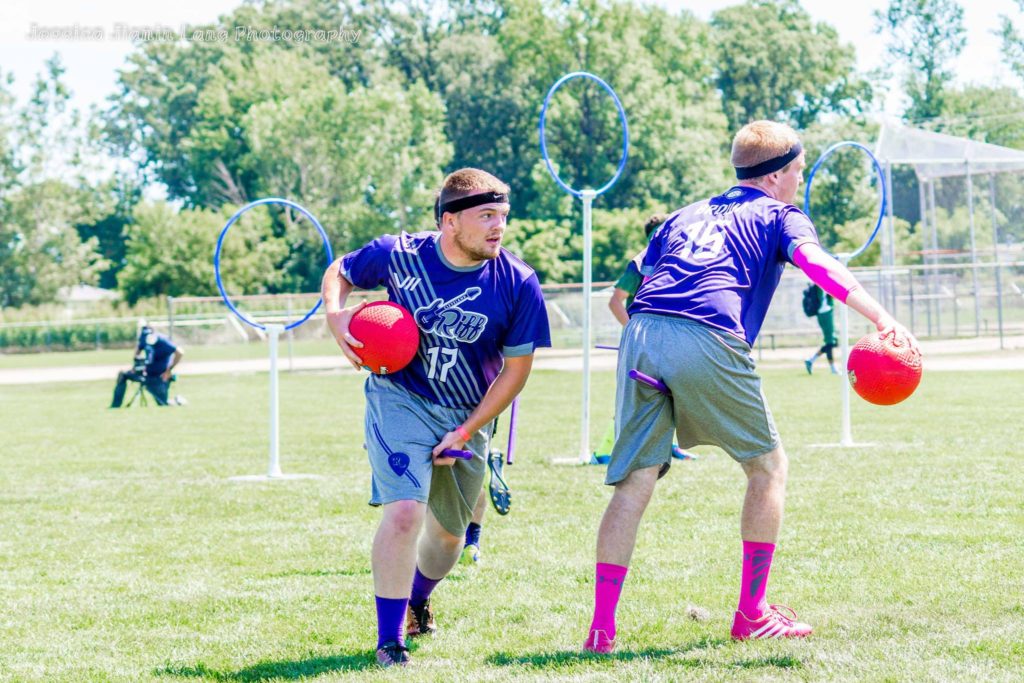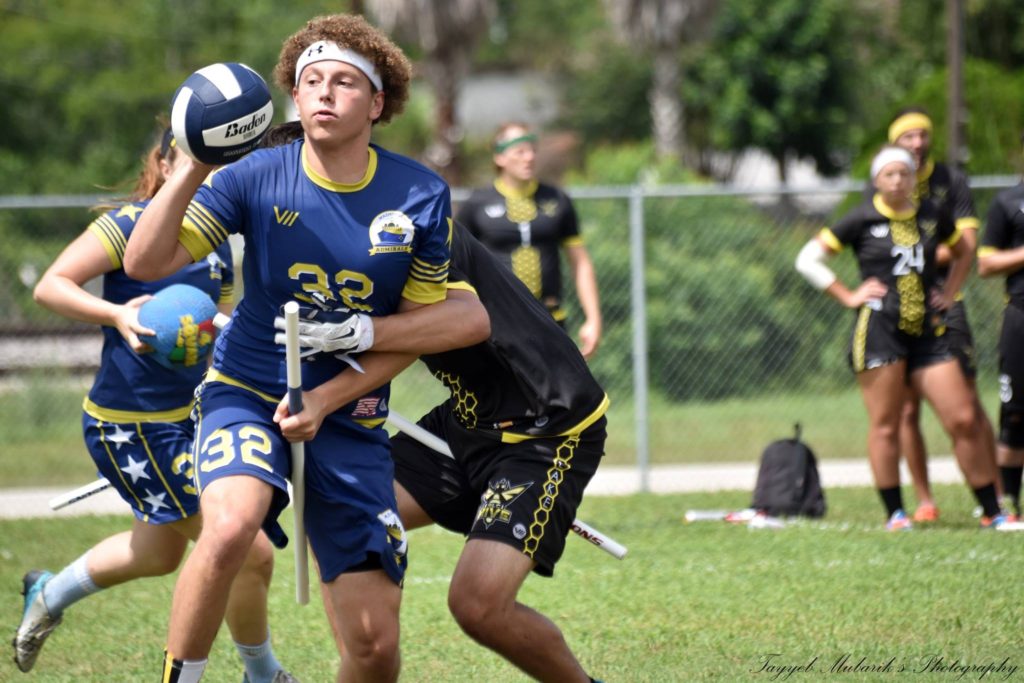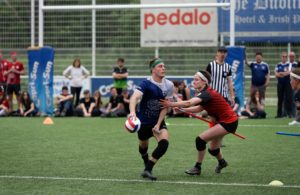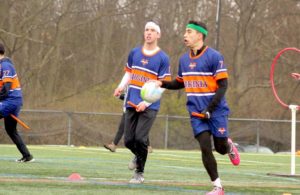- Rule, Britannia, no more?
- Unpopular Opinions: US Quadball Cup 2023
- Proven Contenders: University of Virginia
- Proven Contenders: Rutgers University
- Proven Contenders: University of Michigan
- Proven Contenders: Creighton University
- Different Perspectives: A Look Inside USA Ultimate
- Antwerp QC, Much of Belgian Core, Leaves Competitive Quidditch
Early Season, High Stakes
By Ethan Sturm and Tyler Walker
Managerial Editors
The third MLQ season kicks off this weekend with a slate of three competitive series that will have massive implications for how the entire regular season will play out. Two of the three series feature teams that finished next to each other in the standings a year ago, while the third is in the always-competitive North Division where no team has ever finished a regular season with more than seven wins.
After two years of many teams relying on veterans, rosters across the league have an added dose of youth and Saturday brings us our first chance to see it all in action. It will also be our first opportunity to see how the MLQ-specific rules affect play across the league and how teams will adapt their strategies to them.
So, with all of that in mind, let’s dive right into the first set of series.
North Division
Cleveland Riff (2016: 3-6, 3rd) at Indianapolis Intensity (2016: 7-2, 1st)
June 3, 12 pm EDT
All-Time Series: Indianapolis 4-2
Indianapolis begins its quest for a third-straight North Division crown as they host a Cleveland squad still looking to live up to the expectations heaped on them all the way back in 2015.
Last season, the Intensity played all but two of their games in-snitch range, a result of an offense that scored more than 80 points on just five occasions. This series will be our first chance to see how the addition of Team USA 2016’s Andrew Axtell could help begin to fix that. And with the absence of Zach Conkle on the Riff roster for the weekend, slowing down this newly improved Intensity offense could be a tall task.
Meanwhile, in the beater game, we get a matchup of the best the North has to offer as 2015 North MVP and 2016 Team USA member Tyler Walker goes up against Max McAdoo. While Walker missed much of the past USQ season due to injury and plied his trade with Lone Star Quidditch Club when he was healthy, McAdoo was at the heart of a Bowling Green State University squad that lost just two games all season and has continued to approve. Walker’s return to a region he called home for many years could very well be a rocky one.
More likely than not, there will be multiple snitch range games in this series. If that’s the case, history heavily favors the Intensity, who are 10-2 all-time in SWIM situations during the regular season. While 2016 Team USA seeker and Ball State veteran Jason Bowling is absent this weekend, Illinois State’s Jeffrey Siwek–who he replaced on that Team USA squad–will be more than happy to carry the seeking load in his stead.
Expect a closely contested series but–with Indianapolis so heavily favored in SWIM situations– expect them to exit the opening weekend with the division lead.
East Division
Washington Admirals (2016: 4-5, 3rd) at Ottawa Black Bears (2016: 0-9, 4th)
June 3, 1 pm EDT
All-Time Series: Washington 5-1
For a season opening series, there will be a lot on the line as Washington travels to Ottawa. A series win would mean an inside track to a top three finish in the East Division and a place in League City in August, while a series loss–even by a 2-1 margin–would require the squad to pick up multiple victories against either New York or Boston to have a chance to make the postseason.
While the Admirals hold a sizable advantage in the all-time series, those results fail to tell the full story. Four of the six matches have been in snitch range, including a weather-delayed, overtime match to open their 2015 series.
Washington will be more susceptible to Ottawa than ever before, bringing a short roster to Ottawa with just 17 players and relevant absences including Ben Whong, Cory Apple, Emily Camardo, Natasha Conerly, Brenden Hutton and Darren Creary. It will also serve as Cody Nardone’s debut at beater in MLQ as the Admirals continue a long line of teams trying to throw athleticism at a whole in their beater rotations. Nardone will not have an easy time of it against Martin Chiasson and the rest of an experienced Black Bears beater corps.
For Ottawa, the difficulty will be to figure out where goals will come from this season, with many of their leading scorers from past seasons no longer on the team. Cayden Peixoto should serve as a spark plug with the ball in his hands, but–against well-drilled Washington point defenders– he will need some off-ball production from a young group of Black Bear quaffle players to get the offense humming.
Expect a slow pace early in the series as these two teams feel out each other–as well as the new rules–before both sides pull out the stops in games two and three with a series win on the line. Ottawa is still looking for its first series win in MLQ, but the door has perhaps never been more open than it is now.
West Division
San Francisco Argonauts (2016: 3-6, 3rd) at Salt Lake City Hive (2016: 7-2, 2nd)
July 3, 3 pm EDT
All-Time Series: Salt Lake City 3-0
Last year’s opening series between these two teams was the spark plug for both the Salt Lake City and Dan Howland hype trains. With a mix of well-paced quaffle play, intelligent beating and dominant seeking, Salt Lake was able to sweep a talented San Francisco aside while being outscored by one goal across the three games. In fact, the Hive outscored their opponents in the quaffle game just once all season, but nearly captured the division and finished the 2016 season with a 7-2 regular season that just about no one saw coming.
A year later, neither Howland or backup seeker Edgar Pavlovsky remain with the program, and it will be up to the next generation of Salt Lake players to find a way to repeat the 2016 magic.
Salt Lake’s opening weekend roster has no shortage of size, but it remains to be seen if they can turn that into a more dynamic offense than those of Utah teams we have seen in the past. Offensive success may come down to new addition Connor Kaegi, who makes his MLQ debut in this match. A 6-foot-7 former quarterback recruited to play Div. I football at the University of Montana, this weekend will tell us if he can handle the ebb and flow of a dynamic, high-level quidditch match, especially within the confines of the new MLQ rule changes.
Those rule changes will be a godsend for a talented group of Argonaut beaters that were hamstrung a year ago by Salt Lake’s slowplay, a tactic that will be far more difficult now. Willis Miles IV, David Saltzman and Perry Wang are all comfortable creating through bludger play, and slowing them down will be a tall task for a retooled Hive beater rotation that will feature Hive veteran Sam Carr and new addition Duston Mazzella.
With talented players on both sides of the pitch, this matchup could easily come down to those on the sidelines. Former Hive Head Coach Ben Reuling out-planned his compatriots across the field last year and his tactics rescued three straight victories from the jaws of defeat. Now, with both coaching staffs completely turned over, it is a question whether new Salt Lake Head Coach George Williams can maintain that edge or if new San Francisco Head Coach Andrew Covel can outplay him. Whoever does gets an advantage in the X’s and O’s and should be able to take down the series and keep their division title hopes in range.






